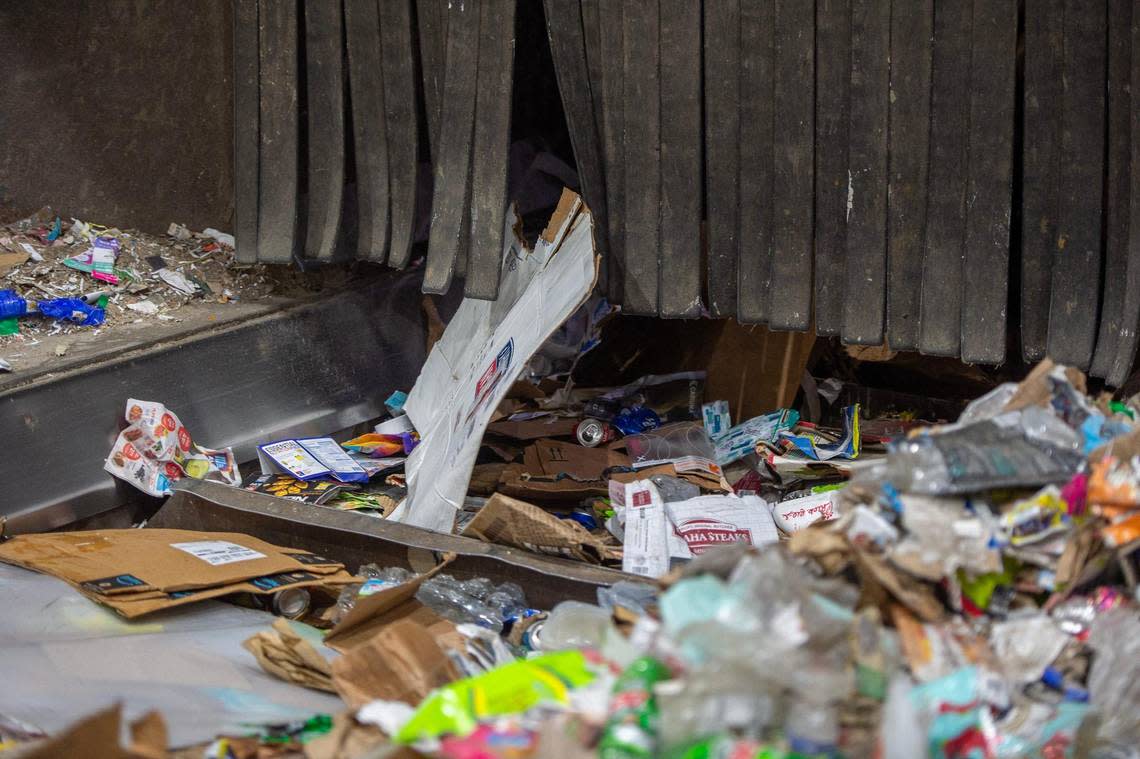Are you recycling wrong? How to fix 10 of the Kansas City area’s most common mistakes

Editor’s note: This story is part of The Star’s series “Talking Trash.” All of the stories were inspired by questions and concerns we heard from Kansas Citians through listening sessions, an online callout and other conversations in our community. Stories will run throughout April, and you can find them all here. You can share thoughts in the form at the bottom of this story, or email kcq@kcstar.com. We’d love for you to join Star staff at a community cleanup event this month (more on that further down).
Many of us want to recycle responsibly and keep as much waste out of the landfill as possible, but recycling the wrong stuff can cause big problems at the two recycling facilities serving the Kansas City area.
Plant managers from both facilities told The Star about some of the bizarre items that turn up in recycling loads.
These items can get tangled in machinery, cause hazards for workers and slow the recycling process down.
Here are 10 commonly recycled items that don’t belong in your bin.
Filmy plastic
“Single use plastic bags are the devil in our world,” GFL employee Tom Coffman told The Star.
The filmy plastics used to make grocery bags, garbage bags, food packaging and so much else are not recyclable using traditional equipment — instead, they gum up the rotating combs of large sorting machines.
But, filmy plastics can be recycled using special equipment. Some area Wal-Mart, HyVee and Target stores have drop-off spots. Find where you can drop yours off by entering your ZIP code here.
Batteries
Tronnie Blair, who runs the recycling facility in Shawnee, told The Star that loose batteries can cause fires on the processing line when they are crushed by machinery.
Used batteries should be taken to your local household hazardous waste facility.
Wonder what happens at Kansas City’s recycling plants? Look behind the scenes here.
Sports equipment
Sports equipment like tennis rackets, basketballs and even bowling balls are common in recycling bins around the metro because they are often made of plastic. However, these items are often made from non-recyclable plastic and are too large for facilities to process.
Donate them or toss them in the trash instead.
Propane tanks
Some metal containers, like soda cans and soup cans, are recyclable in the metro, but Blair says that some recyclers believe that metal recycling extends to propane tanks, which can’t be compressed by machinery.
These tanks also pose a safety hazard if they have any propane left in them.
Take your used propane tanks to be refilled at your local propane supplier. If you’re done with yours, take it to your local household hazardous waste facility instead.
Tanglers
Any long, stringy item can pose problems in recycling facilities because they get snared in machinery. These so-called “tanglers” include string lights, wire and garden hoses.
You may be able to donate these items if they are still in working condition. If they’re not, simply throw them away.
Clothing and fabric
Fabric is a ubiquitous material, but recycling facility managers told The Star that they don’t have an end market in the area. That means no manufacturers are willing to buy old clothing and repurpose the fabric into something new.
Donating or throwing away unwanted clothing is the best way to get rid of it. You can also donate raw fabric to Scraps KC, a local second-hand arts and crafts supply store.
Food containers with food still in them
While many food containers are recyclable, they must be free of contaminants like grease and leftover food before you recycle them.
A few drops of milk or smears of yogurt won’t make an entire batch of recycling unusable, but recycling facilities must keep their bales of raw material as clean as possible in order to maintain their relationships with buyers.
Be sure to empty your unwanted food and drink into the trash or a compost bin before recycling its container.
How does plastics recycling work in KC? Read about it here.
Sharps
Needles, syringes and even knives sometimes make it into the recycling stream, facility managers told The Star.
These can pose health risks to recycling center workers, and they often aren’t made from recyclable materials in the first place.
Secure your unwanted sharps in a sturdy container — a rigid laundry detergent bottle can work well — and throw them away.
Diapers
The GFL recycling facility in Harrisonville, Missouri receives a steady stream of used diapers that human sorters have to remove by hand.
Facility managers urged customers to keep diapers out of the recycling bin, where they can pose health hazards for workers and contaminate bales of raw materials.
Throw diapers and other human waste products in the trash instead.
Furniture
When a recycling dumpster is left unattended, a variety of bulky items may end up inside it.
Facility managers told The Star that they have received mattresses, couches and other large furniture pieces that are not recyclable — and they don’t have the resources to divert these items to donation centers.
To keep your unwanted furniture out of the landfill, donate it to a local thrift store or a nonprofit like Flourish Furniture Bank.
Do you have more questions about how to avoid common recycling mistakes in Kansas City? Ask the Service Journalism team at kcq@kcstar.com.

